J. Edgar
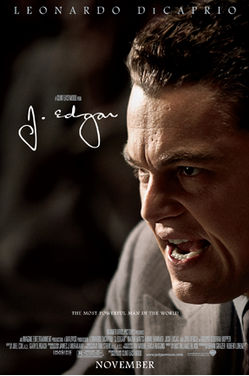
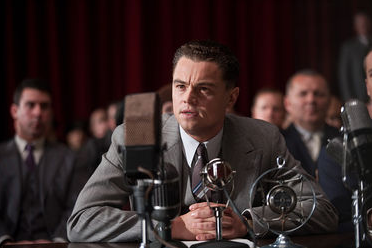 J. Edgar Hoover served as the head of the F.B.I. from 1924, right up until his death in 1972. He made it what it is, with his at the time unorthodox approach to investigating crimes with fingerprints and preserving evidence. He was a controversial figure in a lot of ways, and it's easy to see why Hollywood would be interested in his story. We see bits and pieces in J. Edgar that could serve to be a thrilling film. But it's surrounded by a turgid screenplay that shifts uncomfortably between stuffy dialogue, and over the top theatrical melodrama. This is a shapeless and sloppy movie about an interesting man and subject. It jumps back and forth between different time periods, sometimes without reason or consequence, and simply seems to be a bunch of ideas and facts tossed at the screen at random, as if Eastwood and screenwriter Dustin Lance Black (2008's Milk) don't even know what order they want to tackle things.
J. Edgar Hoover served as the head of the F.B.I. from 1924, right up until his death in 1972. He made it what it is, with his at the time unorthodox approach to investigating crimes with fingerprints and preserving evidence. He was a controversial figure in a lot of ways, and it's easy to see why Hollywood would be interested in his story. We see bits and pieces in J. Edgar that could serve to be a thrilling film. But it's surrounded by a turgid screenplay that shifts uncomfortably between stuffy dialogue, and over the top theatrical melodrama. This is a shapeless and sloppy movie about an interesting man and subject. It jumps back and forth between different time periods, sometimes without reason or consequence, and simply seems to be a bunch of ideas and facts tossed at the screen at random, as if Eastwood and screenwriter Dustin Lance Black (2008's Milk) don't even know what order they want to tackle things.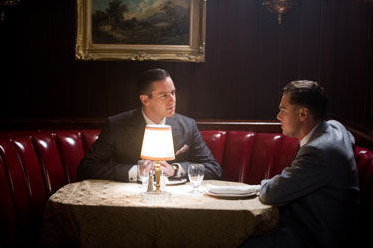 The two main time periods that the movie concerns itself with are the 30s, when Hoover is setting up the F.B.I. and making a name for himself, and the 60s, when he is telling his story for a memoir. The later scenes contain some very uneven make up work, in order to make the actors look older. The work on DiCaprio as the elder Hoover looks fine, but some of the other characters look comically bad to the point where it looks like they're wearing an old man's mask over their face. We meet some of the more important people in Hoover's life, such as his mother (Judi Dench), who he lived with most of his life, and a woman named Helen Gandy (Naomi Watts), who became his loyal secretary for most of the years he was in office.
The two main time periods that the movie concerns itself with are the 30s, when Hoover is setting up the F.B.I. and making a name for himself, and the 60s, when he is telling his story for a memoir. The later scenes contain some very uneven make up work, in order to make the actors look older. The work on DiCaprio as the elder Hoover looks fine, but some of the other characters look comically bad to the point where it looks like they're wearing an old man's mask over their face. We meet some of the more important people in Hoover's life, such as his mother (Judi Dench), who he lived with most of his life, and a woman named Helen Gandy (Naomi Watts), who became his loyal secretary for most of the years he was in office.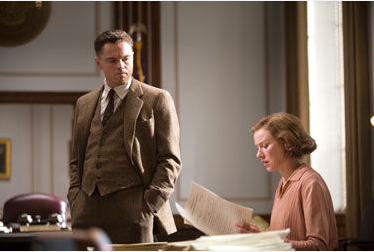 The most important person in Hoover's life, however, was his second at the F.B.I., Clyde Tolson (Armie Hammer from The Social Network). As this movie shows us, Tolson was not only his most trusted agent on the force and personal friend, but also secret romantic interest. And yet, the movie skillfully ducks and weaves on this subject. Oh sure, we get to see them exchange glances that seem more than a little friendly, and even some rather sly hand holding while watching a movie at a theater. But the screenplay pretty much stops there, not really diving into the relationship itself. There's a bombastic scene where the two have a fight about their feelings for each other, complete with throwing glasses, shouting, and a fight that ends in a passionate kiss. The scene ends with Tolson walking away, and Hoover whispering "I love you" as he leaves. Okay, why? The movie keeps us at such a distance from the characters, we never get a clear sense of how they feel about each other, or why.
The most important person in Hoover's life, however, was his second at the F.B.I., Clyde Tolson (Armie Hammer from The Social Network). As this movie shows us, Tolson was not only his most trusted agent on the force and personal friend, but also secret romantic interest. And yet, the movie skillfully ducks and weaves on this subject. Oh sure, we get to see them exchange glances that seem more than a little friendly, and even some rather sly hand holding while watching a movie at a theater. But the screenplay pretty much stops there, not really diving into the relationship itself. There's a bombastic scene where the two have a fight about their feelings for each other, complete with throwing glasses, shouting, and a fight that ends in a passionate kiss. The scene ends with Tolson walking away, and Hoover whispering "I love you" as he leaves. Okay, why? The movie keeps us at such a distance from the characters, we never get a clear sense of how they feel about each other, or why.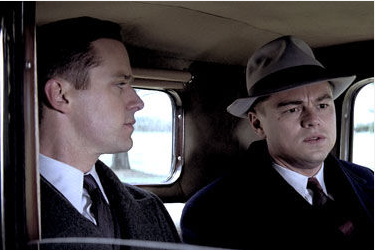 J. Edgar is the kind of movie that feels like it was researched, but the writer pretty much stopped there. He didn't try to truly make us understand Hoover. We get a bunch of facts spilled out on the screen, but there's no emotion or connection in the material. We see bits and pieces of character development that don't go anywhere. We see Hoover's descent into paranoia and narcissism, but there doesn't seem to be all that much behind it. This is a mechanical product. It spits out information, but it never gets close to the heart of the matter. We can see that DiCaprio is trying to humanize Hoover in his performance, but it doesn't work when the script constantly keeps us at a distance. Maybe historical buffs will be able to fill in the movie's blanks, but I have a feeling that most audience members will be left cold by a lot of the characters, and their actions.
J. Edgar is the kind of movie that feels like it was researched, but the writer pretty much stopped there. He didn't try to truly make us understand Hoover. We get a bunch of facts spilled out on the screen, but there's no emotion or connection in the material. We see bits and pieces of character development that don't go anywhere. We see Hoover's descent into paranoia and narcissism, but there doesn't seem to be all that much behind it. This is a mechanical product. It spits out information, but it never gets close to the heart of the matter. We can see that DiCaprio is trying to humanize Hoover in his performance, but it doesn't work when the script constantly keeps us at a distance. Maybe historical buffs will be able to fill in the movie's blanks, but I have a feeling that most audience members will be left cold by a lot of the characters, and their actions.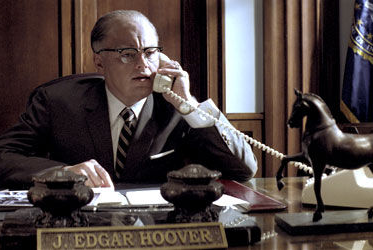
See the movie times in your area or buy the DVD at Amazon.com!






0 Comments:
Post a Comment
<< Home